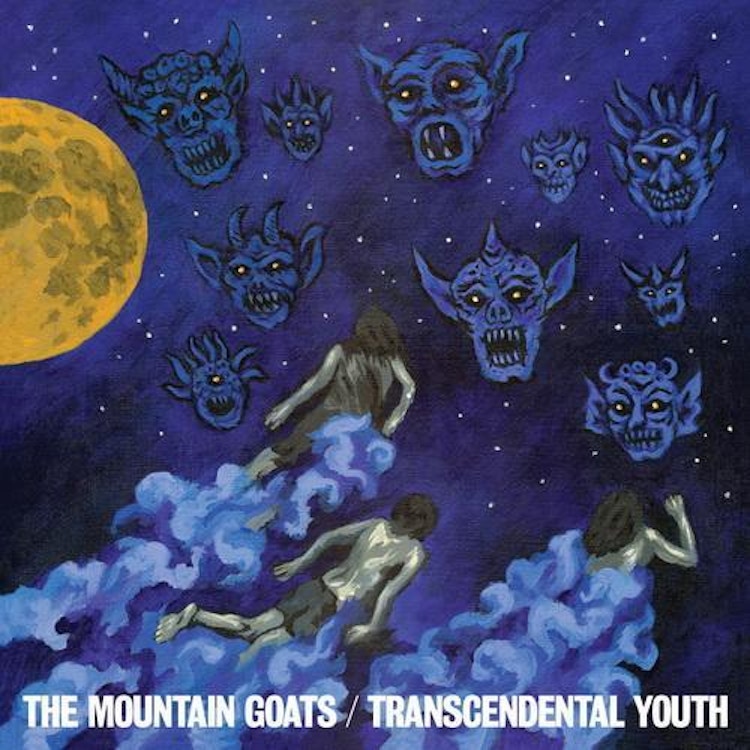"Transcendental Youth"

You can learn a lot about what it means to be a fan of The Mountain Goats by observing the reaction to another album released this October, Muse’s 2nd Law. Those that have stayed the distance (they do exist, believe me) seem divided on Muse’s latest (mis)adventures in “dubstep”, prog and EDM. Those that have long since fallen mostly chuckle from the wayside. Muse have long since descended into parody: now they’re hellbent on shedding any shred of identity that may have remained too.
The Mountain Goats, on the other hand, have always done things incrementally. Their trajectory has been built on subtle tweaks rather than wholesale shape-shifts. As John Darnielle’s musicianship became more competent, for instance, we saw a shift from scruffy, three chord guitar patterns to a fuller range and eventually, primitive piano. The band (at that stage, Darnielle was the band) were once known for their “militantly lo-fi” aesthetic, but with almost each release of this millennium they’ve grown a touch more complex. Given that so much of the band’s innovation takes place on the lyric sheet, too, it’s difficult for casual listeners to pick up on it at all. But for those who hang on, on tenterhooks for each release, these shifts can appear seismic.
It’s always a thrill, then, to hear a new Mountain Goats record filter through the speakers for the first time and for their finest releases, that thrill remains pretty much forever. On album number 14, John Darnielle leaves the wheel in the state it was when he invented it 20 odd years ago. But Transcendental Youth is as nuanced, as poetic and as brilliant as anything we’ve ever heard from him.
The topics of illness and expiry aren’t new to Darnielle’s repertoire and he’s previously tackled them with remarkable grace and empathy. Transcendental Youth deals extensively with mental health and society’s perception of it. According to the Mental Health Foundation, 25 per cent of people experience some kind of mental health problem over the course of a year. Yet, we still react to it wholly uncomfortably and heavy handedly. Throughout, Darnielle challenges this stigma. “I hide in my corner because I like my corner”, he sings on the album opener ‘Amy aka Spent Gladiator 1’. But hey, he suggests, hiding in the corner doesn’t fit with the mould society has cast you in, so you’d better get out of it.
There’s also a wide-eyed questioning of the very notion of consciousness: good dreams vs bad dreams; memories vs reality; life vs death. Mental wellbeing is completely subjective; happiness is transient and mysterious. The whole concept of mind and self seems to fascinate Darnielle and by listening to this record, it’s hard not to become engrossed in it too.
I won’t wheel out that New Yorker quote, but leaving the theme aside, Darnielle’s turn of lyric is, at times, devastating and probably most vivid on the penultimate track, ‘Spent Gladiator 2’. The evolutionary path of popular music has given the simile a particularly rough ride (10,000 spoons, anyone?), but Darnielle exudes gems with alarming ease (“Like a village on the steppe, about to get collectivised”, “like the clock that ticks in Dresden, when the whole town’s been destroyed”).
The gentle musical progression comes this time in the increased (and more sophisticated) deployment of piano and the introduction of Calexico-esque Mariachi horns (a joy on ‘Cry For Judas’). Despite the slight deviation into electronics on the chorus of the gorgeous ‘Until I Am Whole’, there’s no Bellamy-style metamorphosis. Paradoxically, given their name, The Mountain Goats stray only slightly from their beaten path, but not for a want of ambition. Transcendental Youth is a set of tunes written to accommodate a grand subject matter – and it is glorious.
Get the Best Fit take on the week in music direct to your inbox every Friday

Tunde Adebimpe
Thee Black Boltz

Julien Baker & TORRES
Send A Prayer My Way

Bon Iver
SABLE, fABLE





